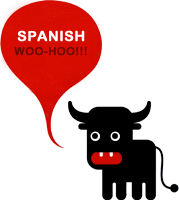Sorry, page not found
Whoops! The page you are looking for cannot be found...
The web address you searched for may not exist or may currently be under construction.
Perhaps you were looking for some information about life in Spain?
Follow the links below to find out more!
Festivals in SpainSpain is famous for its colour, its excitement and its traditions. It's a well-known fact that Spanish people know how to throw a party and this is never more evident than during a festival. Many of Spain's most traditional festivals are of religious origin, though holidays such as Easter and Christmas are celebrated in a unique way. For example, Holy Week (or Semana Santa) is a very sombre event with religious parades and Church services taking place across the country. The Christmas season streches from the end of December until the beginning of January, with gifts being recieved on the 6th of January rather than on Christmas Day. But the festivals that Spain is most recognised for are those full of colour and madness! La Tomatina in Buñol is one of the most famous with thousands of people taking to the streets to throw over 100,000 tomatoes at each other. The San Fermín festival in Pamplona is also very well known, probably because of the high level of risk that comes with it! Every year in July the city holds what is known as the 'Running of the Bulls' which basically involves hundreds of men running through the streets of Pamplona being chased by a herd of bulls. As you'd expect, it's very common for participants to suffer injuries and a number have even died taking part. To find out more information about different festivals in Spain visit: | Autonomous Communities of SpainSpain is split into 17 autonomous communities making it different compared to other countries around the world. Each community prides itself on its own traditions and culture and the diverse Spanish landscape makes every corner of the country unique. The 15 regions of mainland Spain include those such as: Galicia, Catalonia, Navarre, La Rioja, Asturias, Basque Country, Castile-La Mancha, Valencia, Andalusia, Extremadura, Castile & Leon, Madrid and Murcia. The archipelagos of the Balearic and Canary Islands are also recognised as autonomous communities. Under the rule of Franco all autonomous rights were strictly prohibited and Spain was governed as a highly centralised state. Following Franco's death and during the transition to democracy, certain governmental rights were granted to the 17 newly autonomous communities and their official status' were declard in the Spanish Constitution of 1978. Each community is proud of its own, unique traditions and are each in turn home to their own cultural and gastronomical specialities. Language is also of particular importance and languages such as Catalan and Basque share official status with Castilian in the regions where they are spoken. For more details about the communities of Catalonia, the Basque Country, Valencia and Andalusia, click here. |












